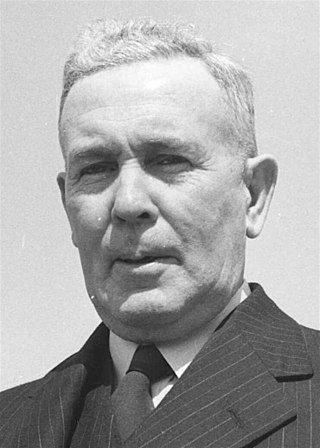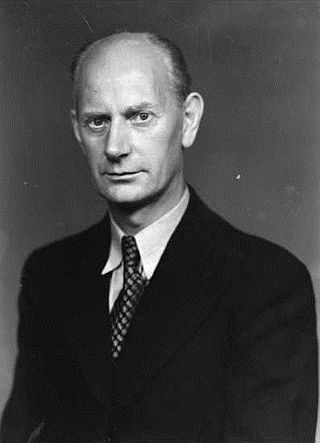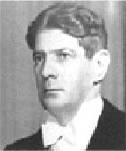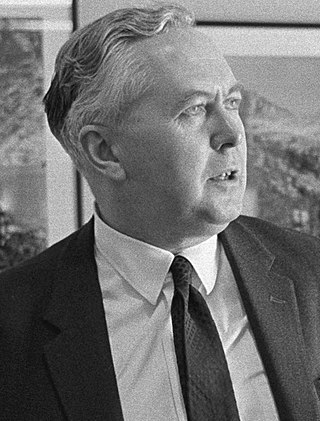
Sir Edward Richard George Heath, commonly known as Ted Heath, was a British politician who served as Prime Minister of the United Kingdom from 1970 to 1974 and Leader of the Conservative Party from 1965 to 1975. Heath also served for 51 years as a Member of Parliament from 1950 to 2001. Outside politics, Heath was a yachtsman, a musician, and an author.

James Harold Wilson, Baron Wilson of Rievaulx, was a British statesman and Labour politician who served as Prime Minister of the United Kingdom twice, from October 1964 to June 1970 and again from March 1974 to April 1976. He was the Leader of the Labour Party from 1963 to 1976, and was a Member of Parliament (MP) from 1945 to 1983. Wilson is the only Labour leader to have formed administrations following four general elections.

Joseph Benedict Chifley was an Australian politician and train driver who served as the 16th prime minister of Australia from 1945 to 1949. He held office as the leader of the Australian Labor Party (ALP), having previously served as the treasurer of Australia under Prime Minister John Curtin and later himself from 1941 to 1949. He was notable for defining Australia's post-war reconstruction efforts.

Willem Drees Sr. was a Dutch politician of the Social Democratic Workers' Party (SDAP) and later co-founder of the Labour Party (PvdA) and historian who served as Prime Minister of the Netherlands from 7 August 1948 to 22 December 1958.

John Curtin was an Australian politician who served as the 14th prime minister of Australia from 1941 until his death in 1945. He held office as the leader of the Australian Labor Party (ALP), having been most notable for leading the country through the majority of World War II, including all but the last few weeks of the war in the Pacific. Curtin's leadership skills and personal character were acclaimed by his political contemporaries and he is frequently ranked as one of Australia's greatest prime ministers and political leaders.

Einar Henry Gerhardsen was a Norwegian politician from the Labour Party of Norway. He was the 22nd prime minister of Norway for three periods, 1945–1951, 1955–1963 and 1963–1965. With totally 16 years in office, he is the longest serving Prime Minister in Norway since the introduction of parliamentarism. Many Norwegians often refer to him as "Landsfaderen" ; he is generally considered one of the main architects of the post-war rebuilding of Norway after World War II. He also served as the second President of the Nordic Council in 1954.

The welfare state of the United Kingdom began to evolve in the 1900s and early 1910s, and comprises expenditures by the government of the United Kingdom of Great Britain and Northern Ireland intended to improve health, education, employment and social security. The British system has been classified as a liberal welfare state system.
Child benefit or children's allowance is a social security payment which is distributed to the parents or guardians of children, teenagers and in some cases, young adults. A number of countries operate different versions of the program. In most countries, child benefit is means-tested and the amount of child benefit paid is usually dependent on the number of children one has.

Juan José de Amézaga Landaroso was a Uruguayan political figure.

The first MacDonald ministry of the United Kingdom lasted from January to November 1924. The Labour Party, under Ramsay MacDonald, had failed to win the general election of December 1923, with 191 seats, although the combined Opposition tally exceeded that of the Conservative government, creating a hung parliament. Stanley Baldwin remained in office until January 1924.

Clement Attlee was invited by King George VI to form the Attlee ministry in the United Kingdom in July 1945, succeeding Winston Churchill as Prime Minister of the United Kingdom. The Labour Party had won a landslide victory at the 1945 general election, and went on to enact policies of what became known as the post-war consensus, including the establishment of the welfare state and the nationalisation of some industries. The government's spell in office was marked by post-war austerity measures, the violent crushing of pro-independence and communist movements in Malaya, the grant of independence to India, the engagement in the Cold War against Soviet Communism as well as the creation of the country's National Health Service (NHS).

Harold Wilson was appointed Prime Minister of the United Kingdom by Queen Elizabeth II on 16 October 1964 and formed the first Wilson ministry, a Labour government, which held office with a thin majority between 1964 and 1966. In an attempt to gain a workable majority in the House of Commons, Wilson called a new election for 31 March 1966, after which he formed the second Wilson ministry, a government which held office for four years until 1970.

The Labour Party governed the United Kingdom of Great Britain and Northern Ireland from 1974 to 1979. During this period, Harold Wilson and James Callaghan were successively appointed as Prime Minister by Queen Elizabeth II. The end of the Callaghan ministry was presaged by the Winter of Discontent, a period of serious industrial discontent. This was followed by the election of Conservative leader Margaret Thatcher in 1979.

The First Labour Government of New Zealand was the government of New Zealand from 1935 to 1949. Responsible for the realisation of a wide range of progressive social reforms during its time in office, it set the tone of New Zealand's economic and welfare policies until the 1980s, establishing a welfare state, a system of Keynesian economic management, and high levels of state intervention. The government came to power towards the end of, and as a result of, the Great Depression of the 1930s, and also governed the country throughout World War II.

The Churchill caretaker ministry was a short-term British government in the latter stages of the Second World War, from 23 May to 26 July 1945. The prime minister was Winston Churchill, leader of the Conservative Party. This government succeeded the national coalition which he had formed after he was first appointed prime minister on 10 May 1940. The coalition had comprised leading members of the Conservative, Labour, and Liberal parties and it was terminated soon after the defeat of Nazi Germany because the parties could not agree on whether it should continue until after the defeat of Japan.

The British Labour Party grew out of the trade union movement of the late 19th century and surpassed the Liberal Party as the main opposition to the Conservatives in the early 1920s. In the 1930s and 1940s, it stressed national planning, using nationalisation of industry as a tool, in line with Clause IV of the original constitution of the Labour Party which called for the "common ownership of the means of production, distribution, and exchange, and the best obtainable system of popular administration and control of each industry or service".

The National Assistance Act 1948 is an Act of Parliament passed in the United Kingdom by the Labour government of Clement Attlee. It formally abolished the Poor Law system that had existed since the reign of Elizabeth I, and established a social safety net for those who did not pay national insurance contributions and were therefore left uncovered by the National Insurance Act 1946 and the National Insurance Act 1946. It also provided help to elderly Britons who required supplementary benefits to make a subsistence living, and obliged local authorities to provide suitable accommodation for those who through infirmity, age, or any other reason were in need of care and attention not otherwise available. The legislation also empowered local authorities to grant financial aid to organizations of volunteers concerned with the provision of recreational facilities or meals.

The National Insurance Act 1946 was a British Act of Parliament passed during the Attlee ministry which established a comprehensive system of social security throughout the United Kingdom.

The Welfare Reform Act 2012 is an Act of Parliament in the United Kingdom which makes changes to the rules concerning a number of benefits offered within the British social security system. It was enacted by the Parliament of the United Kingdom on 8 March 2012.
Child benefits in the United Kingdom are a series of welfare payments and tax credits made to parents with children in the UK, a major part of the welfare state.


















